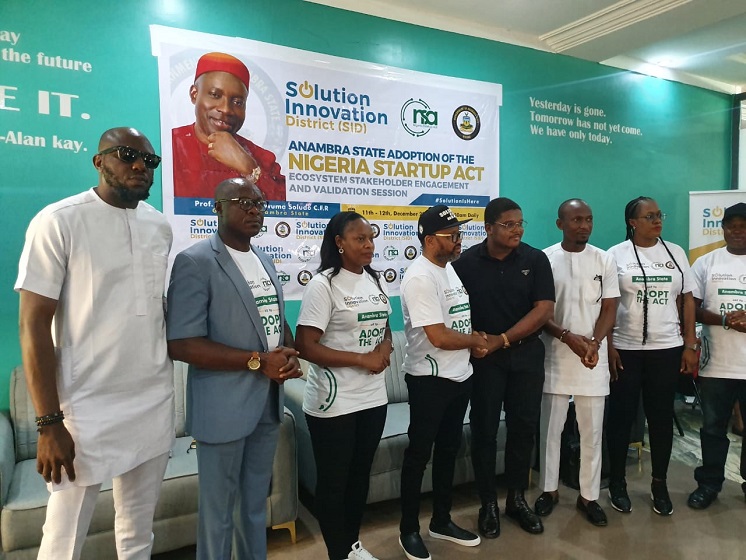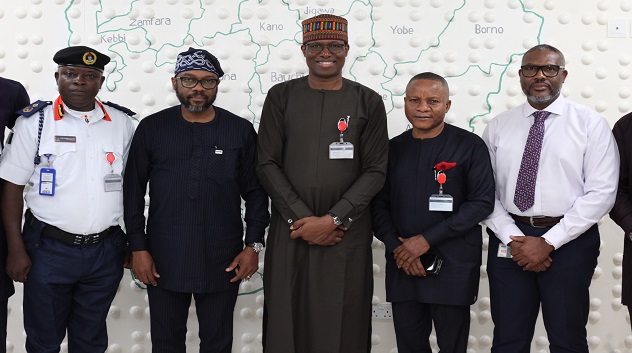Telecom
Anambra Govt Takes Major Leap towards Domestication of Nigeria Start-Up Act with Stakeholders’ Engagement

Anambra State Government has restated its commitment to supporting the streamlining of the state governance systems for greater efficiency, through development of frameworks, laws and procedures.

The State Deputy Governor, Dr Ifeanyichukwu Ibezim made the disclosure during a forum to kick off a two-day stakeholders’ engagement on the domestication of the Nigerian Start-Up Act in Anambra State, held in Awka.
Dr Ibezim re-echoed the dedication of the Chukwuma Soludo-led administration, to making Anambra a technological hub, adding that with the disruptive changes the governor is introducing to the state governance, anyone who fails to keep pace, will be left behind.
He praised the collaboration between the government and partners supporting startups, emphasizing the importance of a tech-driven administration, a promise kept by Governor Soludo’s administration.
He said; “You all seated in this room are the gold we have; we are not looking elsewhere. The journey has just begun and I encourage you to deliberate and chart the course forward for a better Anambra.”
Chukwuemeka Fred Agbata, CFA, MD/CEO of Anambra State ICT Agency, in his goodwill message, posited that the stakeholders’ engagement was imperative to ensure that the Act meets the peculiarities of the state and does not just stand as an imposition of a national law.
CFA de-emphasized the notion of a one-size-fits-all approach to the Nigeria Startup Act, highlighting Anambra’s unique strengths in commerce and trade.
Citing instances with successful ecosystems worldwide and in Lagos on a national level, he attested to Governor Soludo’s commitment to laying the groundwork for innovation through the installation of high-speed broadband internet and the ongoing deployment of fibre cables across the state.
“Innovation lies in the private sector while the government will come up with policies,” he said, urging the ecosystem stakeholders to take charge.
He emphasized that, similar to global trends with OpenAI 4.0 and Google’s Gemini, the private sector should not wait for government intervention but should proactively drive the agenda for a thriving tech ecosystem, with the government playing catch-up.
Describing the Nigeria Startup Act as a co-created legislation emerging from the intersection of displacement and disruption, Mrs. Tracy Okoro Isaac, the State Adoption Lead for the Nigeria Startup Act, reminded the stakeholders that the engagement was history in the making.
She quipped; “In 10 years, you will fondly recall being part of the group that collaborated to establish an ecosystem capable of nurturing Anambra’s unicorns”
Mrs. Okoro-Isaac disclosed that the Act is hinged on four pillars- funding, human development /capacity building, and infrastructure (both software and hardware, internet connection), adding that the Act aims to ensure accessibility and prevent unnecessary migration by fostering innovation, underscoring the Act’s importance for establishing accountability and responsibility, providing concise regulations with clearly defined roles.
She highlighted the success stories of local entrepreneurs, such as those behind Flutterwave and Paystack, who built their startups independent of significant government support, urging attendees to envision the possibilities of creating a united ecosystem that supports startups collectively.
Expressing satisfaction with Governor Soludo’s commitment to innovation, Mrs. Isaac stated that participants were there to contribute to creating a modular startup law, that would shape Anambra’s future.
The convener of the session and Special Adviser to the Governor on Innovation and Business Incubation, Ms. Chinwe Okoli, described the session as more than a legal formality, asserting that it is a profound statement of intent to propel Anambra into a hub of innovation.
“We are fortunate to have a governor who comprehends the transformative influence of technology, setting the groundwork for a state driven by innovation. Our purpose here, therefore, is to participate in this game-changing initiative which is a catalyst for growth and a blueprint shaping the future of our dear state”, she added.
On her part, the Commissioner for Budget and Economic Planning underscored the importance of sustainability, urging stakeholders to safeguard the integrity of the startup ecosystem.
Emphasizing the need to protect both investors and investments, her remarks set the tone for a session that sought not only to embrace change but to ensure its lasting impact.
For the MD of ANSIPPA, Mr. Mark Okoye, stakeholders must commit to actualizing the potentials of the numerous state government’s infrastructure efforts.
The State Chairman of the Nigerian Association of Small and Medium Enterprises, NASME, Chinemerem Oguegbe, lamented the current lack of structure and synergy in the ecosystem as it were while advocating for a more organized approach to attract opportunities.
“The ecosystem in Anambra state is quite different but we are not organized as entrepreneurs nor structured to attract opportunities.
“Let us look for ways to import IT and tech into our businesses,” he urged.
The Dean, Faculty of Physical Sciences, Chukwuemeka Odumegwu Ojukwu University, Prof. K.K.Nwozor, while transitioning to the crux of the matter, acknowledged the need for mentorship beyond youth-focused initiatives and highlighted the untapped potential within Anambra’s universities.
He however applauded Mr. Governor’s appointment of Prof. Kate Omenugha as the Acting Vice-chancellor of the university, describing it as one that will further support the technology drive in the state.
Mr. Dilibe Chinweze, representing hub owners, echoed the call for synergy, emphasizing the importance of investing locally.
As the event concluded, the overarching message was clear – Anambra State is on the brink of a technological revolution and the ICT Agency MD’s impassioned call to stakeholders, amongst other voices, echo as a rallying cry for the private sector to seize the opportunity, taking the lead in shaping a future where Anambra’s innovation ecosystem thrives on its own terms.
The event also featured a presentation on understanding and leveraging the opportunities of the Nigeria Startup Act by Mrs. Okoro Tracy, along with a Startup Pitch Competition with prizes presented by ANSIPPA, SID, and partner, VFD group.
Telecom
IHS Nigeria Hosts Telecom Industry Stakeholders to Discuss Protection of Critical National Infrastructure in Lagos State

IHS Nigeria, part of the IHS Holding Limited (NYSE: IHS) (“IHS Towers”) group, one of the largest independent owners, operators, and developers of shared communications infrastructure in the world by tower count, recently hosted a high-level meeting of stakeholders in the telecommunications industry including regulators and law enforcement agencies, at its corporate headquarters in Lagos.

The meeting was organized to develop a multi-stakeholder action plan for the protection of Critical National Information Infrastructure (CNII) assets in Lagos state.
Recognizing the importance of communications infrastructure as the backbone of national security, economic growth and social cohesion, the stakeholders at the meeting convened under the umbrella of the Association of Licensed Telecoms Operators of Nigeria (ALTON) agreed on the urgent need for collaborative solutions to ensure the protection of these vital assets.
The meeting was attended by senior representatives from the telecommunications stakeholder groups and regulatory bodies including the Nigerian Communications Commission (NCC), the Association of Licensed Telecoms Operators of Nigeria (ALTON), Association of Telecommunications Companies of Nigeria (ATCON) and the Lagos State Infrastructure Maintenance and Regulatory Agency (LASIMRA).
Also in attendance were representatives from the Mobile Network Operators (MNOs), and InfraCos as well as the Nigeria Security and Civil Defence Corps (NSCDC), the security agency tasked with the protection of Critical National Infrastructure across the country.
Following extensive deliberations, the stakeholders resolved to establish a working group dedicated to addressing key industry challenges, including the vandalization and theft of telecommunications infrastructure, arbitrary shutdown of base stations, fiber cuts due to road construction and the denial of access by unauthorized individuals by leveraging technology for real-time monitoring and protection, strengthening security measures around telecommunication sites and collaborating more with the security and regulatory agencies to mitigate these challenges.
The stakeholders underscored the need to prioritize deterrence and prevention of these incidents and highlighted the importance of public awareness campaigns to sensitize the host communities and public of the need to protect telecommunications infrastructure in their localities.
Dapo Otunla, Senior Vice President & Chief Corporate Services Officer of IHS Nigeria, commented, “The protection of Critical National Information Infrastructure (CNII) has been a critical concern for all industry stakeholders.
“We are experiencing daily losses of assets, which significantly impact on the quality of service delivered to subscribers. Addressing these issues is paramount to sustaining Nigeria’s digital ecosystem and meeting regulatory expectations.”
Telecom
MTN Champs Continental Relays: Over 1,000 Athletes Gear Up for Lagos Showcase

Over 1ooo athletes are already set to participate in the upcoming MTN Champs Continental Relays, taking place between April 9 and April 12 at the UNILAG and Yabatech Sports complexes. Organisers anticipate even more registrations before the April 2 deadline.

MTN Champs is Nigeria’s largest grassroots sports competition, a collaboration between MTN Nigeria and Making of Champs (MoC), providing a platform for young athletes to showcase their talents and potentially represent Nigeria on the global stage.
Osaze Ebueku, Senior Manager, Go-to-Market at MTN Nigeria at the opening ceremony of the MTN Champs Classics events in Benin had emphasised the long-term vision behind MTN Champs: “We’re building future Olympians for Nigeria. MTN Champs is about more than competition. It’s about changing lives.”
The continental relays mark the second leg of the MTN Champs Season 3, following the Classics competition in Benin, which saw 4,371 event entries from 2,056 athletes.
As of March 24, the Lagos leg had already recorded 2,821 event entries across different age categories, highlighting the growing enthusiasm around the competition.
The registered athletes are spread across four categories, with 174 in the Cadet (U-14) category, 388 in Youth (U-17), 270 in Junior (U-20), and 279 in the Senior category.
To ensure smooth participation, organisers have outlined important guidelines. Athletes in the Cadet, Youth, and Junior categories must submit a signed Parental Consent Form, while all registered schools and athletes must collect their competition bibs by April 8 at the competition venue to confirm their participation and secure their place on the start list.
Sports enthusiasts can look forward to an electrifying showcase of emerging talent, as young athletes seize the opportunity to prove their skills on a professional stage.
Telecom
Again, Labour Fumes, Threatens Shutdown of Telcos over Non-Implementation of 15 Percent Tariff Reduction

Nigeria Labour Congress (NLC) is threatening to shut down operations of telecommunications companies over their refusal to comment on the 15 percent reduction in telecom tariffs.

Recall that that organised labour, through the NLC, forced the federal government and NCC to reduce the telecommunications tariff hike from 50% to 35% after threatening to shut down telecom operations and the NCC in response to what it saw as exploitative economic policies amidst excruciating suffering, hardship, and deepening poverty.
The government had previously formed a 10-member committee, consisting of five government and NLC representatives, to deliberate on the thorny topic of tariff hikes within two weeks and report back before making a final decision on the new telecom tariff structure.
Consequently, on Friday, February 21, 2025, the committee, at a meeting conducted in the office of the National Security Adviser (NSA) that lasted nearly three hours, decided on a 15 per cent tariff cut.
According to reports, in accordance with the conditions of the agreement, an official communiqué announcing the tariff reduction was scheduled to be released on Saturday, February 22.
According to Chronicle,iIt was said that the meeting began at 4:00 p.m. and concluded around 7:00 p.m., during which NLC representatives insisted that the tariff hike be withdrawn.
According to sources, after significant pressure from NLC representatives in the 10-man committee, the government and NCC gave up and agreed on the 15% decrease, which the government or NCC should have announced the next day.
However, at the time of this report, no such announcement has been made.
Leaders of the labour union are not taking the government’s failure to announce or implement the 15% tariff decrease lightly, suspecting that they have been duped.
The Labour leaders have therefore resolved to directly confront the NCC and telecommunications operators next week.
Though it has been reported that the date for the start of the industrial action against the NCC and telecom providers has been set and mobilisation is underway, the information is being closely guarded.
One of the leaders of the NLC stated that “We have received directives to commence mobilisation since last week. In fact, the date for the commencement of industrial action against the NCC and telecommunication operators’ offices across the country has been fixed. We have been warned not to disclose the date because the plan is to take all concerned by surprise. We are not giving any notice because we thought we had resolved this matter over a month ago. It is as if we have been scammed. Therefore, we have decided to confront the matter head-on.”
On February 12, the NLC expressed outrage over telecommunications companies’ tariff hikes, despite an earlier agreement with the Federal Government and the NCC.
According to the Labour union, “If the telecommunications companies fail to revert to the old tariff by the end of February 2025, a total shutdown of their operations nationwide will commence on March 1, 2025.”
To demonstrate its seriousness, the NLC declared that, as a first step in resisting the arbitrary tariff hike, it directed that workers and other willing citizens boycott the services of MTN, AIRTEL, and GLO daily between 11:00 a.m. and 2:00 p.m. until the end.
On Tuesday, February 11, NLC leaders issued a communiqué at the conclusion of their Central Working Committee (CWC) meeting in Lokoja, Kogi State, urging workers and citizens to suspend data purchases from telecommunications companies, which have also become one of their most effective tools for exploiting Nigerian citizens.
The communiqué, signed by Joe Ajaero and Emma Ugboaja, Congress’ President and General Secretary, respectively, instructed NLC State Councils and industrial union affiliates to quickly sensitise and mobilise their members and the general public in their jurisdictions.

 Telecom3 days ago
Telecom3 days agoAgain, Labour Fumes, Threatens Shutdown of Telcos over Non-Implementation of 15 Percent Tariff Reduction

 News3 days ago
News3 days agoNNPC Ready to Go to Capital Market for IPO- CFIO

 E-Business3 days ago
E-Business3 days agoFG Launches Online Visa Approval Centre

 E-Business3 days ago
E-Business3 days agoQNET Disassociates From Fraudulent Academy in Abuja, Supports EFCC Arrest

 Telecom2 days ago
Telecom2 days agoIHS Nigeria Hosts Telecom Industry Stakeholders to Discuss Protection of Critical National Infrastructure in Lagos State

 E-Financial2 days ago
E-Financial2 days agoTitan Trust Bank Selects Oracle FSS for Core and Digital Banking Technology

 E-Business3 days ago
E-Business3 days agoFirm Discovers Sophisticated Chrome Zero-day Exploit Used in Active Attacks

 Telecom3 days ago
Telecom3 days agoEverything You Need to Know About MTN’s MIP 2025 Fellowship Webinar

























